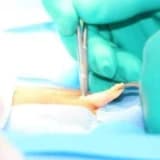The effects of melatonin on angiogenesis and wound healing

ABSTRACT: The pineal gland hormone melatonin is a well-known neoroendocrine hormone. In addition to its immunomodulator effect, it also has a positive effect on monocyte, cytokine, and fibroblast proliferations, which also influence angiogenesis. This study investigated the effects of melatonin hormone on angiogenesis in wound healing on 100 Wistar-Albino rats.MethodsThe rats were divided into two groups. Melatonin dissolved in 0.9% NaCl was administered to the study group in a dose of 0.4mg/kg/rat per day (0.25cc/rat per day), and 0.9% NaCl to the control group in a dose of 0.25cc/rat per day. Incisions 5cm in length were made on the back skin of the rats and the wounds were closed with a skin stapler. Excisional biopsies from healing tissues were taken on the 3rd, 7th, 10th, 14th, and 21st postoperative days. Angiogenesis was evaluated in healing tissues by light and electron microscopy and by hydroxyproline level measurements.ResultsThe commencement of neovascularization and a significant increase (P 0.05) in the number of vessels were observed at all stages of the study group but not in the control group. The tissue hydroxyproline levels were also higher in the study group than in the control group.ConclusionsMelatonin may have a positive effect on both angiogenesis and wound healing.
Gürsel Soybir, Cemalettin Topuzlu, Özgür Odabaş, Kemal Dolay, Ayhan Bilir, Ferda Köksoy
Surgery Today 11/2003; 33(12):896-901.


